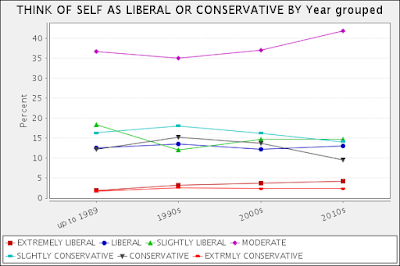Ross Douthat wrote in the NYT recently that the declining appeal of the GOP is the fault of Rush Limbaugh. He claims that Republicans were a 55% proposition during the Reagan Era because the message of conservatism was preached by well-bred men like William F. Buckley. Rush came along and turned conservatism into something angry and strident and that only appeals to 45% of voters.
If Ross is correct, we should see greater support for Reagan among racial minorities--the groups we have a hard time winning over. After all, Buckley was a leading advocate for conservatism during that time and Rush was unknown.
Using the General Social Survey, we can compare minority deficits over time. I calculate this as the percent of a racial minority voting for the GOP presidential candidate minus the percent of all voters who cast a vote for the Republican candidate.
Minority deficit
1980
Blacks -39.2
Mexicans -18.2
1984
Blacks -48.3
Mexicans -19.5
Damn, impressive: under Buckley and Reagan sophistication, Blacks and Mex-Ams supported the GOP by only 18 to 48 points less than the general population! The power of positivity!
And since then? Bush Sr. wasn't strident. Perhaps he did better.
1988
Blacks -41.9
Mexicans -26.2
1992
Blacks -34.6
Mexicans -18.1
1996
Blacks -26.2
Mexicans -12.1
The numbers are slightly less bad with grumpy Dole.
2000
Blacks -42.5
Mexicans -6.5
It looks like angry Rush didn't chase away Mex-Ams in 2000.
2004
Blacks -37.6
Mexicans -11.7
2008
Blacks -34.7
Mexicans -15.3
2012
Blacks -33.3
Mexicans -17.8
2016
Blacks -38.2
Mexicans -19.7
The Republicans did no better among minorities before strident Rush became influential in the early 1990s.
Douthat ignores the obvious: the GOP is struggling because there were fewer than 20 million Hispanics during the Reagan Era. In 2021, there are more than 60 million--and this perennially poor group likes generous social programs and is susceptible to anti-white propaganda like all non-white groups. And probably will be for a very long time.









